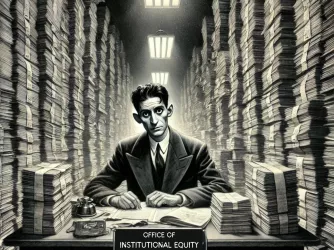Table of Contents
New York Private College Rules: Not Worth the Paper They’re Written On
Bad news from the state of New York, where a judge on September 23 declined to grant a preliminary injunction that would make Le Moyne College, a Jesuit institution in Syracuse, re-enroll an education master’s student it expelled on the basis of personal beliefs. FIRE took up McConnell’s cause last spring when we discovered that the school had blatantly ignored its own policies and procedures, as well as its stated commitment to academic freedom, when it summarily threw McConnell out of school.
Let’s remember why McConnell got in trouble: he was asked to write a paper on what he would do to create his “ideal” classroom environment. In the paper, he stated his belief that “corporal punishment has a place in the classroom” and he expressed skepticism about “multicultural education.” This earned him an A- on the paper—and got him booted out of school because of what Dean Cathy Leogrande called a “mismatch between your personal beliefs regarding teaching and learning and the Le Moyne College program goals.” McConnell had been accepted conditionally, as Le Moyne has taken glee in pointing out, but the conditions were simple: “a grade of ‘B’ or higher” in his initial four courses and the completion of “all admission requirements and/or course deficiencies.” McConnell had a 3.78 grade-point average, but he was never told that when a Le Moyne professor gives you an assignment to write about your ideal classroom, you had better write about Le Moyne’s ideal classroom.
So what of Le Moyne’s own conditions, its procedures, and its commitment to academic freedom? Simply put, they’re not worth the paper they’re written on, and now a New York judge has stepped in to confirm that fact. While the judge states in his decision that academic and administrative decisions are not always above judicial review, he asserted that the decision to throw out Scott McConnell was “uniquely within the professional judgment of those involved in the day-to-day implementation of the educational policies and academic oversight of this educational institution.” There can be no serious dispute that Le Moyne ignored its own written rules and principles—the evidence is on FIRE’s website—and it’s hard not to notice that the judge made no effort to argue that Le Moyne did follow its own rules. Nevertheless, the law apparently protects their “professional judgment” even when that “judgment” is merely the arbitrary whim of Dean Leogrande.
There is plenty of shame, as well as moral culpability, to go around in this case. The worst offender is, of course, Le Moyne College, which made a mockery of its own rules and principles, assigned Scott McConnell an assignment that was really a deceptive booby trap, and then had the audacity to go in front of a judge and argue that the college ought to be allowed to get away with it. The law shares the blame, however, by effectively rendering the rules at any private or religious college a legal nullity in all but the most outrageous circumstances. Thankfully, this is only a trial court ruling and has no binding effect outside the judge’s district. Yet if this principle holds, why should private college students believe a word of the protections or commitments in their student handbooks, and why should their administrators feel any need to be fair or to follow their own rules? Simply put, they shouldn’t. McConnell and the Center for Individual Rights, his legal counsel in the case, plan to appeal. For the sake of private college students everywhere, we hope they will succeed.
Recent Articles
FIRE’s award-winning Newsdesk covers the free speech news you need to stay informed.

UPDATE: Another federal appeals court backs academic free speech for public employees

Feds to Columbia: ‘You want $400 million in contracts back? Do this (or else)’

A picture is worth a thousand words — unless a college district bans it
